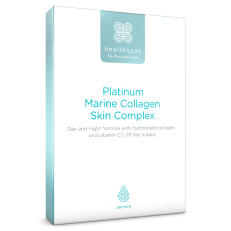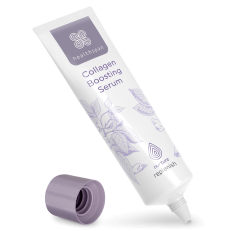Peptides are in plenty of skincare products, so you may already have heard about their anti-ageing, skin-beautifying claims. But what is a peptide, and how will a peptide serum help your skin?
🕒 5 min read
What are peptides?
There are many different types of peptides but in short, many of those in beauty products work by repairing, supplying or protecting our natural proteins.
If you like a bit of technical detail, peptides are essentially tiny constituents of protein; short chains of amino acids that are linked by peptide bonds and form the building blocks of skin proteins such as collagen, elastin and keratin.
Collagen (the plump, bouncy stuff that makes up 75% of our skin), elastin (its stretchy component) and keratin (the more rigid substance) are the skin's most important proteins. In order to keep your complexion supple, smooth and youthful-looking, you need a plentiful supply of their building blocks: amino acids. Unfortunately, collagen and elastin deplete with age, which is where peptides come in.
Natural peptides are produced in the body, and can also be supplied by our diet, mainly in meat, fish, eggs, dairy, wholegrains, legumes and soy, as well as via various supplements.
There are hundreds of different types involved in countless processes in the body, from building muscle, burning fat and digesting food, to regulating hormones and fighting bacteria. You'll also find peptides in medicines, as well as in growth-boosting haircare products and lash serums.
But since not all peptides are the same, which type best helps your skin and where can you find them?
Peptides for skin
In skincare, each type of peptide has its own action, whether it's building proteins, calming inflammation, repairing wounds, boosting hydration, reducing discolouration and more.
As there are so many different kinds, it's easy to divide beauty-related peptides into three main groups:
Signal peptides
This is the communications group. They're basically messengers, and are the most common peptides in skincare, instructing cells to rev up production of collagen and elastin, or sometimes block the enzymes that break them down. Their job is to help local collagen supplies to plump up the skin so that wrinkles appear flatter, while also helping firmness and elasticity.
Carrier peptides
These help deliver active ingredients like enzymes, vitamins, and antioxidants to where they are most useful. Among them are copper peptides, which help form the building blocks involved in collagen production and wound healing.
Platinum Marine Collagen Skin Complex
Premium day and night beauty supplement
- Hydrolysed marine collagen peptides to help slow signs of ageing
- Encourages healthier, more radiant-looking skin
- Selenium and zinc maintain healthy hair; vitamin C protects against environmental damage
Neuropeptides
Also known as neurotransmitter inhibitor peptides, these guard against processes that cause the breakdown of collagen and elastin, or those that cause hyperpigmentation. Some may even inhibit signals to your facial muscles, relaxing them to minimise expression lines: a bit like a mild, needle-free form of Botox.
Peptides in skincare (and other places to find them)
There's more than one way to deploy peptides – from skin supplements as tablets or capsules to topical serums.
Peptides work best when they're combined with other active ingredients, whether it's another kind of peptide, antioxidants to repair and protect, hyaluronic acid for hydration or niacinamide for brightness. Depending on your skin's needs, there will be a combination that can benefit it.
The Platinum Marine Collagen Skin Complex supplement contains hydrolysed marine collagen peptides, as well as antioxidant vitamins, copper and fatty acids to help improve overall condition of the skin. You will also find collagen peptides in Super Strength Marine Collagen Complex, which alongside type II collagen has added vitamin C and copper.
Peptide serum
Hero of Healthspan's skincare range, the Replenish Collagen Boosting Serum contains antioxidant vitamin C plus two different peptides. One is palmitoyl pentapeptide-4, also known by its trade name of Matrixyl, which helps restructure and repair, while the other, RonaCare, helps stimulate cell renewal and softens lines and wrinkles. In tests, around three-quarters of panellists said they noticed their skin looked plumper, with fewer lines and wrinkles, within two weeks.
Replenish Collagen Boosting Serum
Stimulates collagen production for a healthy, youthful appearance
- With natural plant oestrogens and vitamin C to help stimulate collagen production
- Visibly improves skin smoothness and hydration
- Specially formulated for use during and after the menopause
Perfect pairings for your peptides
Retinol
Retinoids are vitamin A derivatives, and are renowned wrinkle-busters. Although retinol and peptides both leave skin firmer and smoother, they're not the same. Peptides work by boosting collagen, while retinoids work by increasing cell turnover to fight lines and wrinkles, supporting collagen and elastin production indirectly.
However, although peptides are low-irritation and good for sensitive skin, retinoids can irritate so need to be introduced gradually. They can also cause sensitivity when exposed to UV rays, so they're best used only at night.
Ceramides
Another possible partner is ceramides, which are perfect for dry and fragile skin. Ceramides reinforce and strengthen a damaged skin barrier, filling in tiny gaps and helping to boost moisture content and environmental protection so that skin becomes more supple and resilient.
When less is more
These potent peptides are only used in tiny quantities, which is another reason they seldom cause irritation. A little goes a long way, which is why, when you check a product's ingredients list, you'll usually find them near the end.
Peptide serums are more popular than peptide moisturisers or creams, as they're lighter, and their silky textures can help concentrated formulas to penetrate more easily. Even so, for best results, give them a few minutes to absorb before applying anything on top.
Apply peptide products after cleansing, both morning and evening, under your favourite day or night cream. They won't deliver miracles overnight but results may be visible in as little as two weeks, with benefits that can carry on accumulating for months.
- We often hear that anti-ageing products contain collagen, but in fact collagen molecules are too large to be absorbed from a topical product. In order to be tiny enough to penetrate, they need to be broken down into hydrolysed collagen i.e. collagen peptides.
- Peptides are short chains of amino acids that are usually between two and 50 amino acids long. If they're longer than that, they're often considered proteins.
- Look at the ingredients list on any beauty product and the word 'peptides' is often preceded by another word that shows the number of amino acids in the conga line-style chain. For example, oligopeptides are peptides with 10-20 amino acids, while polypeptides have more than 20, and some use Greek numbers such as penta or hexa (in pentapeptide or hexapeptide) to indicate it has five or six amino acids respectively.
- Some peptides also have trade names, such as Matrixyl and Ronacare.









